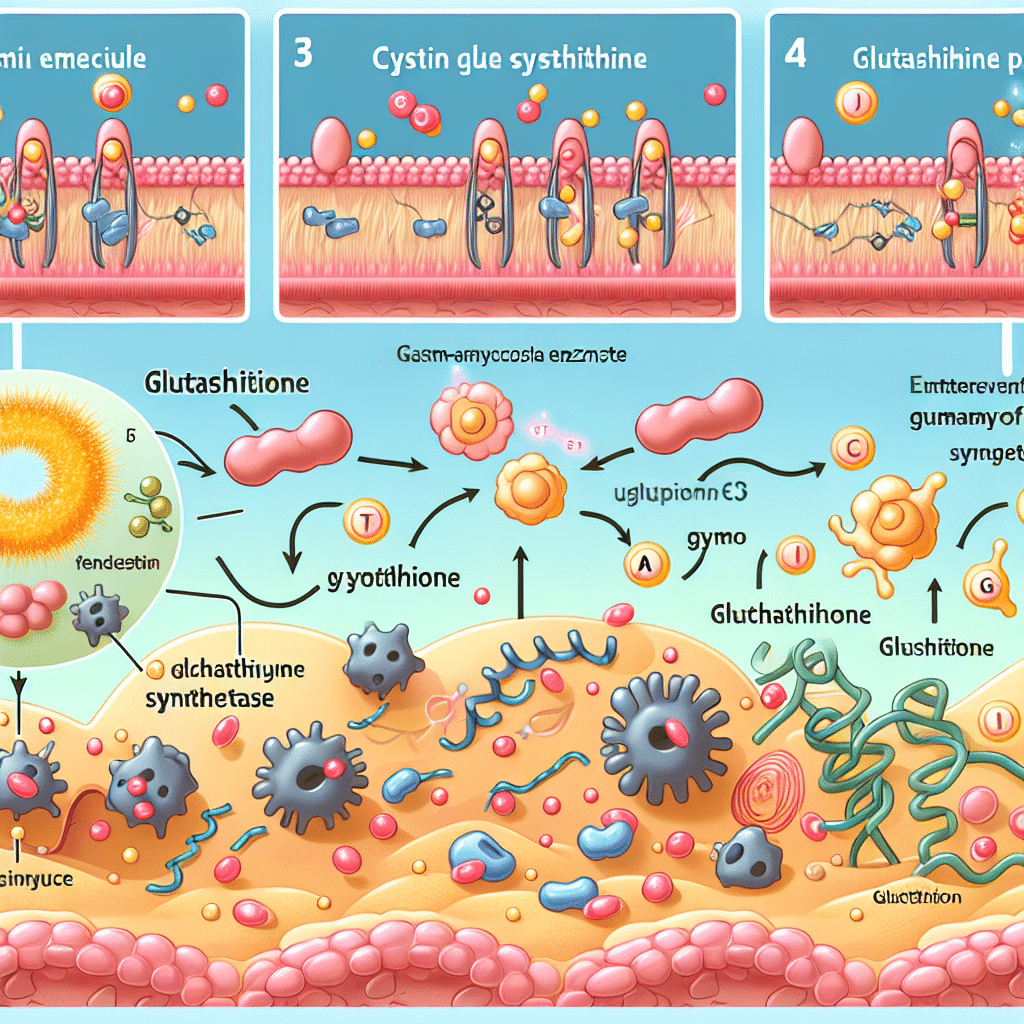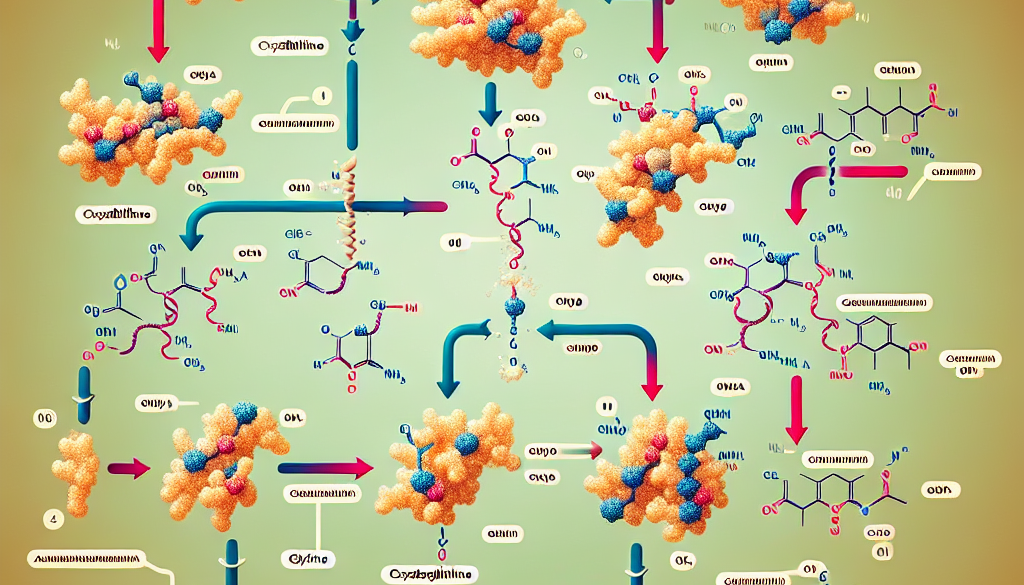Cysteine Glutathione Production: Process
-
Table of Contents
- Cysteine Glutathione Production: Enhancing Health with a Vital Antioxidant
- The Significance of Glutathione in the Body
- Understanding Cysteine’s Role in Glutathione Synthesis
- The Biosynthesis of Glutathione
- Factors Affecting Cysteine and Glutathione Production
- Enhancing Glutathione Production Through Supplementation
- Technological Advances in Glutathione Production
- Case Studies and Research on Glutathione Supplementation
- Conclusion: The Importance of Cysteine Glutathione Production
- Discover ETprotein’s High-Quality Protein Products
Cysteine Glutathione Production: Enhancing Health with a Vital Antioxidant

Glutathione, often referred to as the “master antioxidant,” is a tripeptide composed of three amino acids: cysteine, glutamate, and glycine. It plays a crucial role in protecting cells from oxidative stress, detoxifying harmful substances, and maintaining the immune system. Cysteine is the rate-limiting component in glutathione synthesis, meaning its availability determines the rate at which glutathione can be produced. Understanding the process of cysteine glutathione production is essential for both scientific and medical communities, as well as for individuals seeking to optimize their health.
The Significance of Glutathione in the Body
Before delving into the production process, it’s important to recognize the significance of glutathione in the body. Glutathione is involved in various biological processes, including:
- Neutralizing free radicals and reactive oxygen species (ROS)
- Regenerating vitamins C and E to their active forms
- Supporting the immune system
- Facilitating the metabolism and excretion of toxins
- Regulating cell proliferation and apoptosis
- Acting as a cofactor for several antioxidant enzymes
Given its wide range of functions, maintaining optimal glutathione levels is vital for overall health and well-being.
Understanding Cysteine’s Role in Glutathione Synthesis
Cysteine is a sulfur-containing amino acid that is critical for glutathione synthesis. Its thiol (sulfhydryl) group is responsible for the antioxidant activity of glutathione. The body acquires cysteine through diet, protein turnover, and the transsulfuration pathway from methionine. However, dietary intake and natural production may not always meet the body’s demands, especially under stress or illness, making supplementation and enhanced production methods important.
The Biosynthesis of Glutathione
The biosynthesis of glutathione occurs in two ATP-dependent steps:
- Step 1: The enzyme gamma-glutamylcysteine synthetase catalyzes the formation of gamma-glutamylcysteine from glutamate and cysteine.
- Step 2: Glutathione synthetase adds glycine to gamma-glutamylcysteine to form glutathione.
This process primarily takes place in the liver, which is the main site of glutathione synthesis and recycling.
Factors Affecting Cysteine and Glutathione Production
Several factors can influence the body’s ability to produce cysteine and glutathione:
- Dietary intake: Consuming foods rich in cysteine, such as poultry, yogurt, egg whites, and legumes, can boost production.
- Metabolic demand: Conditions that increase oxidative stress, such as illness or intense exercise, can deplete glutathione levels.
- Genetic factors: Variations in genes related to glutathione metabolism may affect individual production rates.
- Age: Glutathione levels naturally decline with age, reducing the antioxidant defenses of the body.
- Environmental toxins: Exposure to pollutants and toxins can increase the need for glutathione for detoxification.
Enhancing Glutathione Production Through Supplementation
Supplementation with cysteine donors, such as N-acetylcysteine (NAC) or whey protein, can help increase glutathione levels. NAC is a precursor to cysteine and has been shown to boost glutathione synthesis effectively. Additionally, s-adenosylmethionine (SAMe), alpha-lipoic acid, and vitamins B6, B12, and folate can support the transsulfuration pathway, enhancing cysteine availability.
Technological Advances in Glutathione Production
Advancements in biotechnology have led to innovative methods for producing glutathione commercially. Fermentation processes using yeasts or bacteria genetically engineered to overproduce glutathione have become increasingly popular. These methods allow for large-scale production of high-purity glutathione for use in supplements, pharmaceuticals, and cosmetics.
Case Studies and Research on Glutathione Supplementation
Research has demonstrated the potential benefits of glutathione supplementation in various health conditions:
- A study on patients with nonalcoholic fatty liver disease showed that glutathione supplementation improved liver function and reduced oxidative stress.
- In individuals with Parkinson’s disease, intravenous glutathione was found to provide symptomatic relief and slow disease progression.
- Glutathione has been used to enhance immune function in patients with HIV/AIDS, leading to improved outcomes.
These studies underscore the therapeutic potential of boosting glutathione levels in managing certain diseases.
Conclusion: The Importance of Cysteine Glutathione Production
In summary, cysteine is a critical component in the synthesis of glutathione, a vital antioxidant that supports numerous bodily functions. Factors such as diet, metabolic demand, and environmental stressors can affect glutathione production. Technological advances and supplementation strategies can help maintain optimal levels, potentially offering therapeutic benefits in various health conditions. Understanding and enhancing cysteine glutathione production is essential for promoting health and preventing disease.
Discover ETprotein’s High-Quality Protein Products
If you’re looking to support your glutathione levels through dietary supplementation, ETprotein offers a range of high-quality protein products that can help. Their selection includes organic rice protein, pea protein, and other plant-based options that are rich in cysteine and other amino acids necessary for glutathione synthesis. With non-GMO, allergen-free attributes, and high purity standards, ETprotein’s products are suitable for a variety of industries and dietary needs.
About ETprotein:
ETprotein, a reputable protein and L-(+)-Ergothioneine (EGT) Chinese factory manufacturer and supplier, is renowned for producing, stocking, exporting, and delivering the highest quality organic bulk vegan proteins and L-(+)-Ergothioneine. They include Organic rice protein, clear rice protein, pea protein, clear pea protein, watermelon seed protein, pumpkin seed protein, sunflower seed protein, mung bean protein, peanut protein, and L-(+)-Ergothioneine EGT Pharmaceutical grade, L-(+)-Ergothioneine EGT food grade, L-(+)-Ergothioneine EGT cosmetic grade, L-(+)-Ergothioneine EGT reference grade and L-(+)-Ergothioneine EGT standard. Their offerings, characterized by a neutral taste, non-GMO, allergen-free attributes, with L-(+)-Ergothioneine purity over 98%, 99%, cater to a diverse range of industries. They serve nutraceutical, pharmaceutical, cosmeceutical, veterinary, as well as food and beverage finished product distributors, traders, and manufacturers across Europe, USA, Canada, Australia, Thailand, Japan, Korea, Brazil, and Chile, among others.
ETprotein specialization includes exporting and delivering tailor-made protein powder and finished nutritional supplements. Their extensive product range covers sectors like Food and Beverage, Sports Nutrition, Weight Management, Dietary Supplements, Health and Wellness Products, and Infant Formula, ensuring comprehensive solutions to meet all your protein needs.
As a trusted company by leading global food and beverage brands and Fortune 500 companies, ETprotein reinforces China’s reputation in the global arena. For more information or to sample their products, please contact them and email sales(at)ETprotein.com today.














